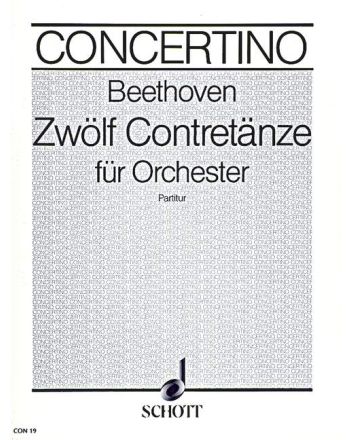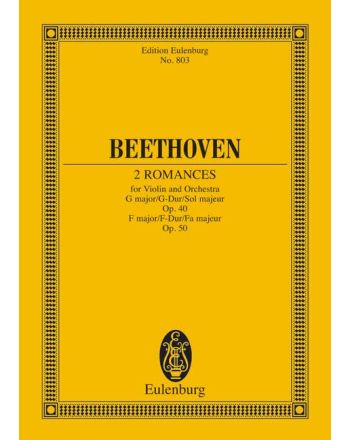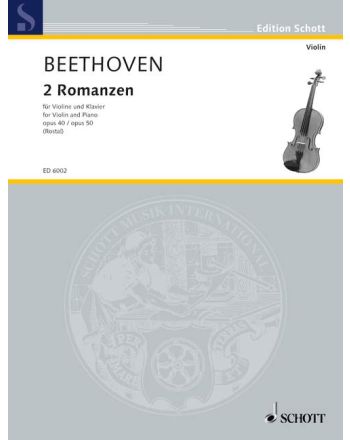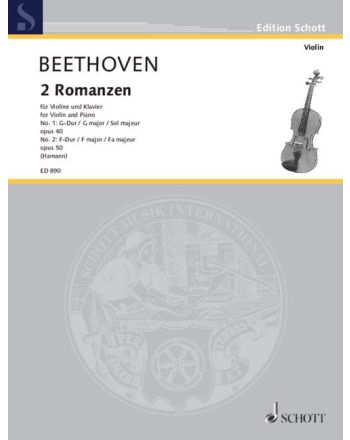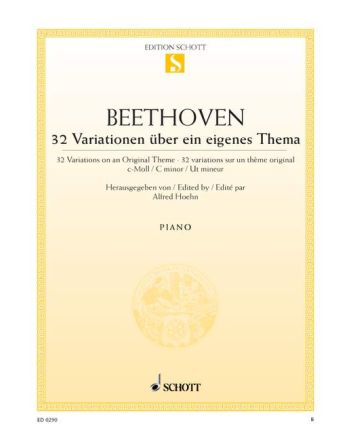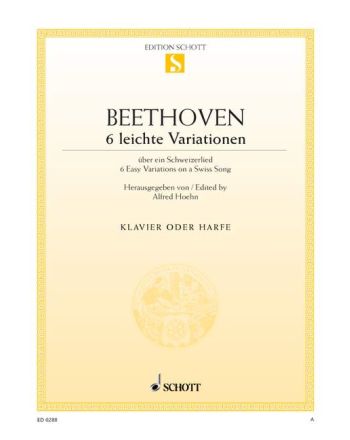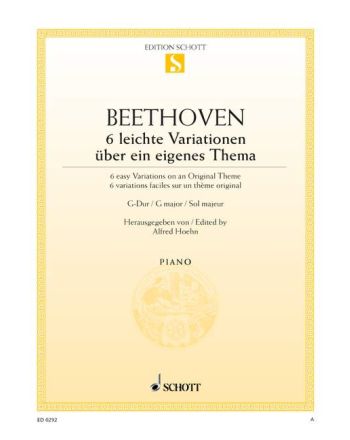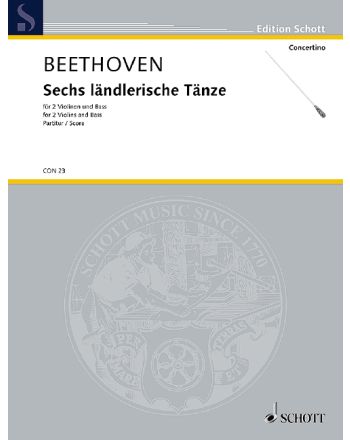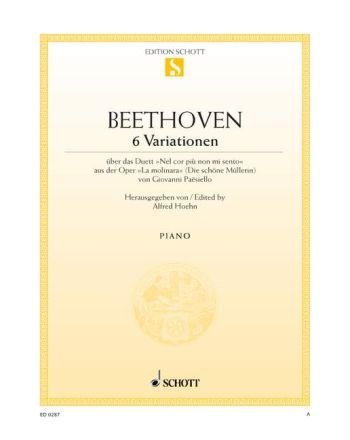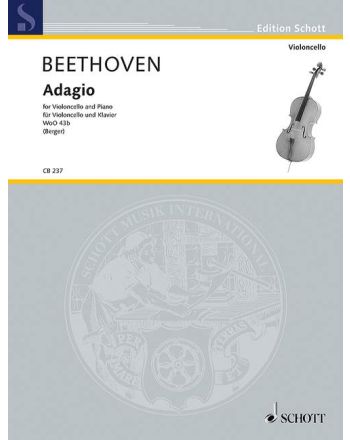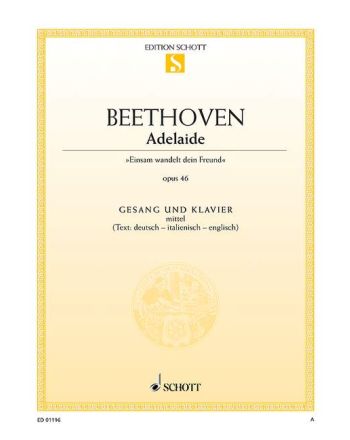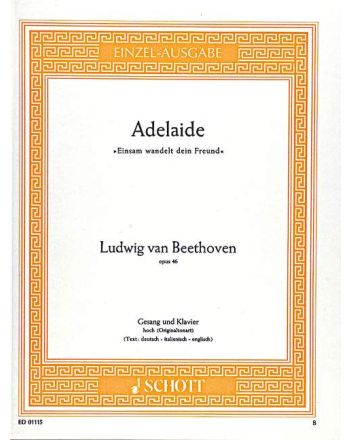
Ludwig van Beethoven
Pays d'origine:
Allemagne
Date d'anniversaire:
17 décembre 1770
Date de décès:
26 mars 1827
À propos de Ludwig van Beethoven
Ludwig van Beethoven is the most important symphonic composer of the Viennese Classicism. In 1781 the son of the Prince Elector's court tenor singer Johann van Beethoven became a pupil of Christian Gottlob Neefe (*1748, 1798) who introduced him to works from the pre-classical period, especially of the Mannheim School, and let him take his place at the organ already in 1782. In 1784 Beethoven became a member (violist and harpsichordist) of the court chapel in Bonn. In 1787 he went to Vienna, at the expense of the Prince Elector, to become a pupil of Mozart, but he had to break off his stay after 14 days because of his mother's serious illness. In 1792 he went to Vienna for the second time and became a pupil of Haydn (Mozart had died in the mean time). In addition, he studied theory with Johann Georg Albrechtsberger and Italian vocal composition with Antonio Salieri.
In Vienna Beethoven gave his first public performance as a pianist with his Piano Concerto in B flat major Op. 19 on 29.3.1795. The very same year he also published Op. 1, three piano trios dedicated to Prince Carl Lichnowsky. Great reception and support was bestowed on him in the houses of the Viennese aristocracy into which he was introduced by Count Ferdinand von Waldstein. As a pianist, teacher and composer, he soon enjoyed a high standing. Since he had left Bonn, he had never taken a position and mainly earned a living by composing dedication works. When King Jérôme of Westphalia called him to Kassel in 1808, Archduke Rudolph (a pupil of Beethoven), Prince Franz Joseph von Lobkowitz and Count Ferdinand von Kinsky offered him an annual salary of 4,000 florins to keep him in Vienna. Except for a journey to Prague, Dresden, Leipzig and Berlin (1796) and visits to spa towns such as Teplitz among others (1811 and 1812, encounter with Goethe), Beethoven never left Vienna.
Around 1810, Beethoven was at the zenith of his fame. However, he was profoundly affected by a hearing defect which had become noticeable since 1795 and led to increasing hardness of hearing in 1808 and eventually total deafness around 1819. He retired from society more and more and even had to give up giving concerts. Indicative of his suffering and his ethics is »Heiligenstädter Testament«, written in 1802 as a farewell letter to his brothers. In the last years of his life, communication with him was only possible in writing, as is documented by »Konversationshefte«. A liver and intestine disease, probably due to lead poisoning, caused his death in 1827. The Austrian poet Franz Grillparzer wrote the funeral address. Thousands attended his funeral on the cemetery of Währingen on 29.3.1827, Schubert being one of the 38 torchbearers at Beethoven's coffin during the funeral procession. In 1888 Beethoven's remains were moved to the Central Cemetery of Vienna.
Oeuvre:
Beethoven's oeuvre centres on instrumental music. It was due to him that it became the epitome of music as an emotional language of the people living in this world. In the works of the first creative period (until ca. 1802), the piano trios Op. 1 (1795), piano sonatas (»Sonate pathétique«, 1798/99), string quartets, symphonies (No.1 in C major 1799/1800) and piano concertos (No. 3 in C minor, 1800/02), the unmistakable 'tone of Beethoven' is fully developed: the distinct character of the principal theme which determines entirely the individual movements with regard to structure and content, no matter whether opposing and synthesizing; the tranquility and intimacy of the middle movements, the dance-like brusque or defiant nature of the scherzos, and the power of the final movements which is liberating from the inside. Later these characteristic features were deepened and their dimensions expanded: the use of the contrasting material in the development and coda (Symphony No. 3 »Eroica«), the representation of passion (»Kreutzersonate«, »Sonata appassionata«), the drama (overture »Coriolan«), the dance-like effusive (Symphony No. 7), the radiation of consolation, calmness and grandeur (adagio of Symphony No. 4, Symphony No. 6 »Pastorale«).
The late creative period, starting with the last five piano sonatas and ending with the last five string quartets, is characterized by the retreat into the inner world which was encouraged by his deafness and made Beethoven develop his late style combining the sensual communication through tones with the most profound intellectuality of compositional thinking. At the same time, the message to the people intensified in the works meant for the wide public. The highlights are Symphony No. 9 which, in order to elucidate the spiritual statement, includes the human voice in the choral finale based on the text of Schiller's »Ode to Joy«, and »Missa solemnis« in which Beethoven deliberately took up compositional church music traditions and incorporated them in his essentially symphonic style, even in his vocal oeuvre. As is indicated by the three versions and several solutions to the overture problem, his only opera »Fidelio« had caused the instrumental composer Beethoven major difficulties.
Due to Beethoven, there emerged a new kind of composing. After a constantly increasing musical audience had learned, thanks to Haydn and Mozart, to understand demanding instrumental music, this demand, and thus the demand for the novelty of the music as well as its market value continued to increase after the turn of the century. Whereas Haydn had written over 100 symphonies and Mozart almost 50 symphonies, the number of Beethoven's symphonies came to only nine, each of which having its own individual character. Beethoven's sketchbooks with more than 5,000 sheets provide an insight into his work process, into the composer's struggles and development processes.
With Beethoven, the music of the Viennese Classicism reached both its climax and its end. Classical aspects in Beethoven's music are not only the musical form which still focusses on the sonata form, but also the complete congruency of form and content. What is new in his music, as compared to Haydn and Mozart, is the emphasis of the ethical moment, the setting up of oppositions, the surging of the will against them, and the gestures of liberating efforts. This is what sets Beethoven apart from the simultaneous musical Romanticism: He does not oppose the real world to »another world«, but his music is aimed at the world to improve and refine it.
At the same time, however, Beethoven rang in the »19th century« with regard to music history: He was regarded as undisputed superlative of all previous music. Even if in the middle of this century the music was divided into the contrasts of aesthetics of form and content, programme music and absolute music, new German school and conservative school, Wagner and Brahms, both sides always quoted and referred to Beethoven.
At the same time, however, Beethoven rang in the »19th century« with regard to music history: He was regarded as undisputed superlative of all previous music. Even if in the middle of this century the music was divided into the contrasts of aesthetics of form and content, programme music and absolute music, new German school and conservative school, Wagner and Brahms, both sides always quoted and referred to Beethoven.
Produits
-
Edited from the autograph by Jochen ReutterCompositeur: Ludwig van BeethovenEditeur: Jochen ReutterMedia Type: PartitionEdition: UrtextausgabeSérie: Wiener Urtext Edition
Instrumentation: pianoNuméro du produit: UT50425Format papierFormat papierEn stock4,95 €TTC, hors expédition -
Compositeur: Ludwig van BeethovenEditeur: Walter KolnederEdition: PartitionSérie: Concertino
Instrumentation: orchestreNuméro du produit: CON 19Type de produitEn stockPrix à partir de 15,99 €TTC -
Compositeur: Ludwig van BeethovenEditeur: Walter KolnederMedia Type: Partition électronique en PDFEdition: Partie séparée, HornSérie: Concertino
Instrumentation: orchestreNuméro du produit: CON 19-15 Q19433Partition PDFPartition PDFEn stock1,99 €TTC -
Compositeur: Ludwig van BeethovenEditeur: Walter KolnederMedia Type: Partition électronique en PDFEdition: Partie séparée, FagottSérie: Concertino
Instrumentation: orchestreNuméro du produit: CON 19-14 Q19432Partition PDFPartition PDFEn stock1,99 €TTC -
Compositeur: Ludwig van BeethovenMedia Type: Partition électronique en PDFEdition: Partie séparée, KlarinetteSérie: Concertino
Instrumentation: orchestreNuméro du produit: CON 19-13 Q19431Partition PDFPartition PDFEn stock1,99 €TTC -
Compositeur: Ludwig van BeethovenEditeur: Walter KolnederMedia Type: Partition électronique en PDFEdition: Partie séparée, OboeSérie: Concertino
Instrumentation: orchestreNuméro du produit: CON 19-12 Q19430Partition PDFPartition PDFEn stock1,99 €TTC -
Compositeur: Ludwig van BeethovenEditeur: Walter KolnederMedia Type: Partition électronique en PDFEdition: Partie séparée, FlöteSérie: Concertino
Instrumentation: orchestreNuméro du produit: CON 19-11 Q19429Partition PDFPartition PDFEn stock1,99 €TTC -
Compositeur: Ludwig van BeethovenEditeur: Walter KolnederMedia Type: Partition électronique en PDFEdition: Partie séparée, Violine 1Série: Concertino
Instrumentation: orchestreNuméro du produit: CON 19-16 Q15168Partition PDFPartition PDFEn stock1,99 €TTC -
Compositeur: Ludwig van BeethovenEditeur: Walter KolnederMedia Type: Partition électronique en PDFEdition: Partie séparée, Violine 2Série: Concertino
Instrumentation: orchestreNuméro du produit: CON 19-17 Q15167Partition PDFPartition PDFEn stock1,99 €TTC -
Compositeur: Ludwig van BeethovenEditeur: Walter KolnederMedia Type: Partition électronique en PDFEdition: Partie séparée, Violoncello/KontrabassSérie: Concertino
Instrumentation: orchestreNuméro du produit: CON 19-18 Q15155Partition PDFPartition PDFEn stock1,99 €TTC -
Compositeur: Ludwig van BeethovenEditeur: Walter KolnederMedia Type: PartitionEdition: Jeu de parties, Flöte; 2 Oboen I/II; 2 Klarinetten I/II; 2 Fagotte I/II; 2 Hörner I/II; 4 Violinen I; 4 Violinen II; 4 Violoncelli/KontrabässeSérie: Concertino
Instrumentation: orchestreNuméro du produit: CON 19-50Format papierFormat papierEn stock54,00 €TTC, hors expédition -
Transcriptions pour quintette à ventCompositeur: Ludwig van BeethovenArrangeur: Peter StammMedia Type: PartitionEdition: Partition et partiesSérie: Simrock Original Edition
Numéro du produit: EE 5341Format papierFormat papierEn stock38,50 €TTC, hors expédition -
Compositeur: Ludwig van BeethovenArrangeur: Eric KuhlstromSérie: Edition Schott
Instrumentation: pianoNuméro du produit: ED 438Type de produitEn stockPrix à partir de 9,99 €TTC -
Compositeur: Ludwig van BeethovenEdition: Partition d'étudeInstrumentation: violon et orchestreNuméro du produit: ETP 803Type de produitEn stockPrix à partir de 7,99 €TTC
-
sol majeur / fa majeurCompositeur: Ludwig van BeethovenArrangeur: Max RostalSérie: Edition Schott
Instrumentation: violon et pianoNuméro du produit: ED 6002Type de produitEn stockPrix à partir de 11,99 €TTC -
sol majeur / fa majeurCompositeur: Ludwig van BeethovenSérie: Edition Schott
Instrumentation: violon et pianoNuméro du produit: ED 890Type de produitEn stockPrix à partir de 11,99 €TTC -
Compositeur: Ludwig van BeethovenArrangeur: Alexandra RosenMedia Type: PartitionInstrumentation: flûte à bec sopranoNuméro du produit: ED 10712Format papierFormat papierEn stock7,50 €TTC, hors expédition
-
Compositeur: Ludwig van BeethovenMedia Type: Partition électronique en PDFNuméro du produit: ED 23307 Q53307Partition PDFPartition PDFEn stock3,99 €TTC
-
UrtextCompositeur: Ludwig van BeethovenEditeur: Jochen ReutterMedia Type: PartitionEdition: UrtextausgabeSérie: Wiener Urtext Edition
Numéro du produit: UT50290Format papierFormat papierEn stock8,50 €TTC, hors expédition -
Compositeur: Ludwig van BeethovenEditeur: Alfred HoehnInstrumentation: pianoNuméro du produit: ED0 290Type de produitEn stockPrix à partir de 4,99 €TTC
-
sur un thème originalCompositeur: Ludwig van BeethovenMedia Type: Partition électronique en PDFSérie: Edition Schott
Instrumentation: pianoNuméro du produit: SF 8979 Q6851Partition PDFPartition PDFEn stock4,99 €TTC -
on a Swiss songCompositeur: Ludwig van BeethovenEditeur: Alfred HoehnInstrumentation: Piano ou harpeNuméro du produit: ED0 288Type de produitEn stockPrix à partir de 3,99 €TTC
-
on an original themeCompositeur: Ludwig van BeethovenEditeur: Alfred HoehnInstrumentation: pianoNuméro du produit: ED0 292Type de produitEn stockPrix à partir de 3,99 €TTC
-
Compositeur: Ludwig van BeethovenEditeur: Walter KolnederEdition: Jeu de parties, Parties solistesSérie: Concertino
Instrumentation: orchestre à cordes (2 violons et basse)Numéro du produit: CON 23-71Type de produitEn stockPrix à partir de 9,99 €TTC -
Compositeur: Ludwig van BeethovenEditeur: Walter KolnederEdition: PartitionSérie: Concertino
Instrumentation: orchestre à cordes (2 violons et basse)Numéro du produit: CON 23Type de produitEn stockPrix à partir de 11,99 €TTC -
Compositeur: Ludwig van BeethovenEditeur: Walter KolnederMedia Type: Partition électronique en PDFEdition: Partie séparée, Violoncello/KontrabassSérie: Concertino
Instrumentation: orchestre à cordes (2 violons et basse)Numéro du produit: CON 23-13 Q24099Partition PDFPartition PDFEn stock1,99 €TTC -
Compositeur: Ludwig van BeethovenEditeur: Walter KolnederMedia Type: Partition électronique en PDFEdition: Partie séparée, Violine IISérie: Concertino
Instrumentation: orchestre à cordes (2 violons et basse)Numéro du produit: CON 23-12 Q24098Partition PDFPartition PDFEn stock1,99 €TTC -
Compositeur: Ludwig van BeethovenEditeur: Walter KolnederMedia Type: Partition électronique en PDFEdition: Partie séparée, Violine ISérie: Concertino
Instrumentation: orchestre à cordes (2 violons et basse)Numéro du produit: CON 23-11 Q24097Partition PDFPartition PDFEn stock1,99 €TTC -
Compositeur: Ludwig van BeethovenEditeur: Walter KolnederMedia Type: PartitionEdition: Jeu de parties, Parties d'orchestreSérie: Concertino
Instrumentation: orchestre à cordes (2 violons et basse)Numéro du produit: CON 23-70Format papierFormat papierEn stock45,00 €TTC, hors expédition -
Compositeur: Ludwig van BeethovenArrangeur: Georg KinskyEdition: Partie séparée, Violine ISérie: Antiqua
Instrumentation: 2 Violons et Basse (Violoncelle), Piano ad lib.Numéro du produit: ANT 13-11Type de produitEn stockPrix à partir de 2,99 €TTC -
Compositeur: Ludwig van BeethovenArrangeur: Georg KinskyMedia Type: Partition électronique en PDFEdition: Partie séparée, KlavierSérie: Antiqua
Instrumentation: 2 Violons et Basse (Violoncelle), Piano ad lib.Numéro du produit: ANT 13-14 Q20091Partition PDFPartition PDFEn stock3,99 €TTC -
Compositeur: Ludwig van BeethovenArrangeur: Georg KinskyMedia Type: Partition électronique en PDFEdition: Partie séparée, VioloncelloSérie: Antiqua
Instrumentation: 2 Violons et Basse (Violoncelle), Piano ad lib.Numéro du produit: ANT 13-13 Q10769Partition PDFPartition PDFEn stock2,99 €TTC -
Compositeur: Ludwig van BeethovenArrangeur: Georg KinskyMedia Type: Partition électronique en PDFEdition: Partie séparée, Violine IISérie: Antiqua
Instrumentation: 2 Violons et Basse (Violoncelle), Piano ad lib.Numéro du produit: ANT 13-12 Q86Partition PDFPartition PDFEn stock2,99 €TTC -
Compositeur: Ludwig van BeethovenArrangeur: Georg KinskyMedia Type: Partition électronique en PDFEdition: PartitionSéries: Antiqua
Edition Schott
Instrumentation: 2 Violons et Basse (Violoncelle), Piano ad lib.Numéro du produit: ANT 13 Q84Partition PDFPartition PDFEn stock6,99 €TTC -
on the duet "Nel cor più non mi sento" from the opera "La molinara" by Giovanni PaesielloCompositeur: Ludwig van BeethovenEditeur: Alfred HoehnInstrumentation: PianoNuméro du produit: ED0 287Type de produitEn stockPrix à partir de 3,99 €TTC
-
Compositeur: Ludwig van BeethovenEditeur: Richard ClarkeMedia Type: Partition avec CDEdition: Paquet, EAS 192, 186, 109, 187, 115, 143, 175, 193, 150Série: Eulenburg Audio+Score
Instrumentation: orchestreLangue: Allemand, AnglaisNuméro du produit: EAS 14Format papier + CDFormat papier + CDEn stock99,00 €TTC, hors expédition -
Compositeur: Ludwig van Beethoven | Sir Harrison BirtwistleInterprète: Nicolas HodgesMedia Type: CDNuméro du produit: WER 68102CDCDEn stock18,50 €TTC, hors expédition
-
CanonCompositeur: Ludwig van BeethovenEditeur: Betty BertauxMedia Type: PartitionEdition: Partition de choeurSérie: Betty Bertaux Choral Series
Instrumentation: choeur d'enfants ou choeur de femmes (SSS) a cappellaNuméro du produit: BHI 46368Format papierFormat papierEn stock3,00 €TTC, hors expédition -
Arranged from the original for Mandolin and PianoCompositeur: Ludwig van BeethovenArrangeur: Julius BergerSéries: Cello Library
Edition Schott
Instrumentation: violoncelle et pianoNuméro du produit: CB 237Type de produitEn stockPrix à partir de 8,99 €TTC -
from the Piano Sonata No. 13 C minor "Pathétique"Compositeur: Ludwig van BeethovenArrangeur: Wolfgang BirtelMedia Type: Partition électronique en PDFNuméro du produit: ED 21563 Q40307Partition PDFPartition PDFEn stock2,99 €TTC
-
Compositeur: Ludwig van BeethovenArrangeur: Armin SchmidtMedia Type: PartitionEdition: Partition et partiesInstrumentation: flûte, violon, guitare et pianoLangue: Allemand, Français, AnglaisNuméro du produit: ZM18470Format papierFormat papierEn stock9,50 €TTC, hors expédition
-
für OrchesterCompositeur: Ludwig van BeethovenMedia Type: Matériel en location / d'exécutionEdition: Matériel d'exécutionMatériel en location / d'exécutionMatériel en location / d'exécution
-
für elektronische OrgelCompositeur: Ludwig van BeethovenArrangeur: Willi NagelMedia Type: PartitionInstrumentation: orgue électriqueNuméro du produit: SIK1330Format papierFormat papierEn stock6,50 €TTC, hors expédition
-
from: Sonata PathétiqueCompositeur: Ludwig van BeethovenArrangeur: Kristin ThielemannMedia Type: Partition électronique en PDFNuméro du produit: ED 22323-50 Q41875Partition PDFPartition PDFEn stock2,99 €TTC
-
Themes From Movement II, No. 8, Op. 13Compositeur: Ludwig van BeethovenArrangeur: Greg YasinitskyMedia Type: PartitionEdition: Partition et partiesInstrumentation: flûte, hautbois, clarinette, cor en fa, basson/clarinette basseNuméro du produit: KN 16823Format papierFormat papierEn stock16,50 €TTC, hors expédition
-
Themes From Movement II, No. 8, Op. 13Compositeur: Ludwig van BeethovenArrangeur: Greg YasinitskyMedia Type: PartitionEdition: Partition et partieInstrumentation: saxophone alto et pianoNuméro du produit: KN 11261Format papierFormat papierÉpuisé11,50 €TTC, hors expédition
-
Themes From Movement II, No. 8, Op. 13Compositeur: Ludwig van BeethovenArrangeur: Greg YasinitskyMedia Type: PartitionEdition: Partition et partieInstrumentation: clarinette et pianoNuméro du produit: KN 10916Format papierFormat papierEn stock11,50 €TTC, hors expédition
-
(from Sonata C sharp minor, Op. 27, No. 2 "Moonlight Sonata")Compositeur: Ludwig van BeethovenEditeur: Monika TwelsiekMedia Type: Partition électronique en PDFInstrumentation: pianoNuméro du produit: ED 9043 Q23184Partition PDFPartition PDFEn stock2,99 €TTC
-
Compositeur: Ludwig van BeethovenInstrumentation: voix moyenne et pianoNuméro du produit: ED0 1116Type de produitEn stockPrix à partir de 4,99 €TTC
-
Type de produitEn stockPrix à partir de 4,99 €TTC


